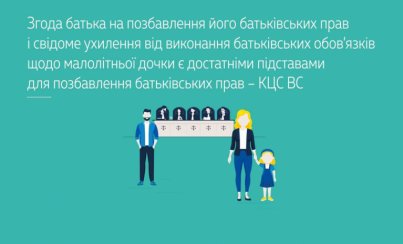Contact center of the Ukrainian Judiciary 044 207-35-46

Deliberate, prolonged (about five years) avoidance of parental responsibilities for the upbringing of a minor child, which led to the lack of psycho-emotional bond between the father and the child, the latter's application for deprivation of his parental rights in relation to the child, the child's adaptation to the family relationship with the mother's new husband are sufficient grounds for deprivation of parental rights.
This conclusion was reached by the Supreme Court as part of the panel of judges of the First Judicial Chamber of the Civil Cassation Court.
In this case, the plaintiff sought to deprive her ex-husband of parental rights over their minor child, arguing that the defendant had shown no interest in his daughter's health for about five years, had shown no parental attention or care for the child, and had not participated in her upbringing.
The court of first instance resolved the dispute given the father's objections to the deprivation of his parental rights and his expressed desire to participate in the child's upbringing, and proceeded from the absence of legal grounds for applying such an extreme measure as deprivation of parental rights to the defendant.
The same position was taken by the court of appeal. The court of appeal rejected the defendant's application for relinquishment of parental rights and his consent to the deprivation of parental rights, noting that the said application could not serve as the sole and sufficient basis for depriving the defendant of parental rights in relation to his daughter.
At the cassation stage, the child's mother and father, as well as the children's service, assured the court that the deprivation of the biological father's parental rights to his young daughter pursued a legitimate goal - it was in the child's best interests. All the participants in the case confirmed that the biological father had not communicated with his daughter, born in 2018, for almost five years, has no psycho-emotional contact with her, and has no intention of fulfilling his parental responsibilities. The father does not comply with the schedule of contact between the child and the father, established by the children's service. The biological father did not object to the deprivation of his parental rights, believing that it was in the child's best interests. The child is growing up and being brought up in a happy family. The child's family life includes a stepfather, whom the child calls dad, who brings up the child, supports her and intends to adopt her.
The Civil Cassation Court of the Supreme Court cancelled the court decisions of the courts of previous instances and satisfied the claim for deprivation of parental rights. The panel of judges of the SC CivCC, having considered the case in an open court session with the parties to the case summoned, took into account that in accordance with paragraph 50 of the Guidelines for Child Friendly Courts of the Committee of Ministers of the Council of Europe, the principle of urgency should be applied to all proceedings involving children in order to obtain a prompt response and best protect the interests of the child in compliance with the rule of law.
Delays in the proceedings have a negative impact on children and their development. Inefficient and, in particular, delayed proceedings in cases concerning children may lead to a violation of positive obligations under Article 8 of the Convention for the Protection of Human Rights and Fundamental Freedoms (ECHR judgment of 3 September 2015 in M. and M. v. Croatia, application no. 10161/13, § 179, 182).
The panel of judges took into account that the case had been in court for almost a year, while the minor child was due to start primary school this year, and the analysis of the arguments of the parties to the case and the interests of the child could be carried out by the cassation court (ECHR judgment of 28 January 2021 in Satanovska and Rodgers v. Ukraine, application no. 12354/19 § 35).
Resolution of the Civil Cassation Court of the Supreme Court of 19 February 2025 in case No. 147/277/24 (proceedings No. 61-17253св24) - https://reyestr.court.gov.ua/Review/125296237.
This and other legal opinions of the Supreme Court are available in the Database of Legal Positions of the Supreme Court - https://lpd.court.gov.ua.